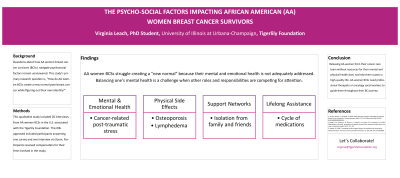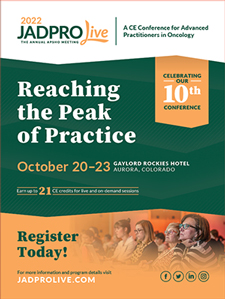Back


APSHO Patient Perspective Posters
JL1015P: The Psychosocial Factors Impacting African American Women Breast Cancer Survivors
Saturday, October 22, 2022
10:00 AM – 11:00 AM ET

Has Audio
.jpg)
Virginia Leach, PhD Student (she/her/hers)
Manager of Research & Writing
Tigerlily Foundation & University of Illinois at Urbana-Champaign
Stone Ridge, Virginia, United States
Poster Presenter(s)
Background:
Breast Cancer (BC) mortality rates disproportionately affect African American (AA) women over any other racial or ethnic group in the United States. However, questions about how AA women who survive the disease navigate psychosocial factors such as body image, self-esteem, stigma and shame, thoughts and fears surrounding fertility, and romantic relationships remain unanswered. This study's primary research question is, "How do AA women BC survivors create a new normal post-breast cancer while figuring out their own identity?"
Methods:
This qualitative study aims to address the psychosocial factors experienced by 20 AA women BC survivors in the U.S. The 20 women were recruited to participate in the IRB-approved study (University of Illinois at Urbana-Champaign) through the Tigerlily Foundation, a non-profit breast cancer advocacy organization. The total duration of the study lasted a maximum of 1 hour and 45 minutes with participants answering one pre-interview questionnaire for demographic purposes and one interview with a member of the research team.
Findings:
Preliminary results from the data conclude that AA women BC survivors, and potentially all cancer survivors, mirror individuals in the postpartum phase. Being postpartum is not inherently harmful; however, if one begins to experience symptoms of depression, loss of appetite, irritability, and insomnia for an extended period, there is a high possibility they are experiencing Postpartum Depression (PPD). BC survivors experience numerous changes that can drastically impact their quality of life. AA women BC survivors struggle immensely with body image and self-confidence issues after experiencing breast cancer, various surgeries, and treatments.
Implications:
If BC survivors, particularly AA women BC survivors experiencing systemic and institutional racism, are treated with the same care postpartum individuals are given, there can be a shift in how oncologists work with BC survivors. Creating more personalized survivorship care plans between patients, oncologists, and hospital-based social workers can improve psychosocial factors experienced by AA women BC survivors.
Breast Cancer (BC) mortality rates disproportionately affect African American (AA) women over any other racial or ethnic group in the United States. However, questions about how AA women who survive the disease navigate psychosocial factors such as body image, self-esteem, stigma and shame, thoughts and fears surrounding fertility, and romantic relationships remain unanswered. This study's primary research question is, "How do AA women BC survivors create a new normal post-breast cancer while figuring out their own identity?"
Methods:
This qualitative study aims to address the psychosocial factors experienced by 20 AA women BC survivors in the U.S. The 20 women were recruited to participate in the IRB-approved study (University of Illinois at Urbana-Champaign) through the Tigerlily Foundation, a non-profit breast cancer advocacy organization. The total duration of the study lasted a maximum of 1 hour and 45 minutes with participants answering one pre-interview questionnaire for demographic purposes and one interview with a member of the research team.
Findings:
Preliminary results from the data conclude that AA women BC survivors, and potentially all cancer survivors, mirror individuals in the postpartum phase. Being postpartum is not inherently harmful; however, if one begins to experience symptoms of depression, loss of appetite, irritability, and insomnia for an extended period, there is a high possibility they are experiencing Postpartum Depression (PPD). BC survivors experience numerous changes that can drastically impact their quality of life. AA women BC survivors struggle immensely with body image and self-confidence issues after experiencing breast cancer, various surgeries, and treatments.
Implications:
If BC survivors, particularly AA women BC survivors experiencing systemic and institutional racism, are treated with the same care postpartum individuals are given, there can be a shift in how oncologists work with BC survivors. Creating more personalized survivorship care plans between patients, oncologists, and hospital-based social workers can improve psychosocial factors experienced by AA women BC survivors.

